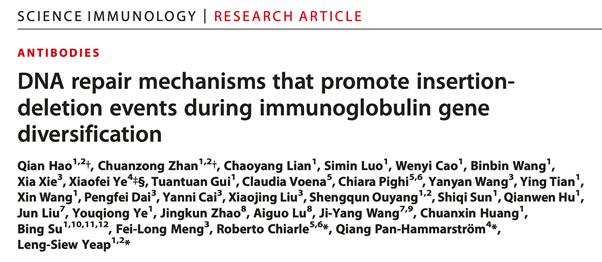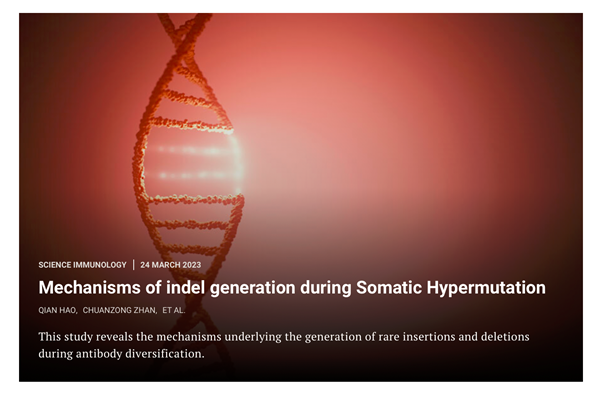The article DNA Repair Mechanisms That Promote Insertion-Deletion Events During Immunoglobulin Gene Diversification was published in Science Immunology by PI Leng-Siew Yeap Lab of Shanghai Jiao Tong University School of Medicine/Shanghai Institute of Immunology on March 24, 2023, reported the results of their work to elucidate the mechanisms that generate rare mutagenic outcomes of antibody diversification process, with implications for the generation of antiviral broadly neutralizing antibodies and the development of autoantibodies.

Abstract:
Insertions and deletions (indels) are low-frequency deleterious genomic DNA alterations. Despite their rarity, indels are common, and insertions leading to long complementarity-determining region 3 (CDR3) are vital for antigen-binding functions in broadly neutralizing and polyreactive antibodies targeting viruses. Because of challenges in detecting indels, the mechanism that generates indels during immunoglobulin diversification processes remains poorly understood. We carried out ultra-deep profiling of indels and systematically dissected the underlying mechanisms using passenger-immunoglobulin mouse models. We found that activation-induced cytidine deaminase–dependent ±1–base pair (bp) indels are the most prevalent indel events, biasing deleterious outcomes, whereas longer in-frame indels, especially insertions that can extend the CDR3 length, are rare outcomes. The ±1-bp indels are channeled by base excision repair, but longer indels require additional DNA-processing factors. Ectopic expression of a DNA exonuclease or perturbation of the balance of DNA polymerases can increase the frequency of longer indels, thus paving the way for models that can generate antibodies with long CDR3. Our study reveals the mechanisms that generate beneficial and deleterious indels during the process of antibody somatic hypermutation and has implications in understanding the detrimental genomic alterations in various conditions, including tumorigenesis.

Link: https://www.science.org/doi/10.1126/sciimmunol.ade1167
About Lab:
Laboratory of Antibody Diversification
The research in the Yeap laboratory focuses on understanding the mechanisms of antibody diversification, specifically on how rare mutational outcomes from programmed DNA lesion processes in B cells contribute to anti-viral broadly neutralizing antibody (bnAb) activities or B cell-related diseases. Rare mutational outcomes on antibody genes such as insertion-deletions (indels), long complementarity determining region 3 (CDR3) and improbable mutations on certain nucleotides are bottlenecks that hinder the elicitation of bnAbs in vaccine strategies, resulting in the inefficiency of the immune system in fighting a fast evolving virus during a pandemic. We are interested in dissecting the genetic pathways that generate these rare mutational outcomes during Immunoglobulin (Ig) Somatic Hypermutation processes. Our lab has generated more than 40 mouse genetic models based on an in vivo hypermutating passenger-immunoglobulin B cell system and performed ultra-deep profiling of the mutational outcomes on the passenger-Ig gene to elucidate the pathways that generate the rare mutational outcomes and the effect of DNA sequences on mutation rate. Our ultimate aim is to generate humanized antibody mouse models based on our knowledge of antibody diversification processes to screen bnAbs and test vaccines. As the mutational outcomes during B cell receptor diversification processes also cause diseases such as autoimmune diseases and B cell cancers, we are also interested in collaborating with clinicians to identify the antibodies and antigens that resulted in these diseases.




